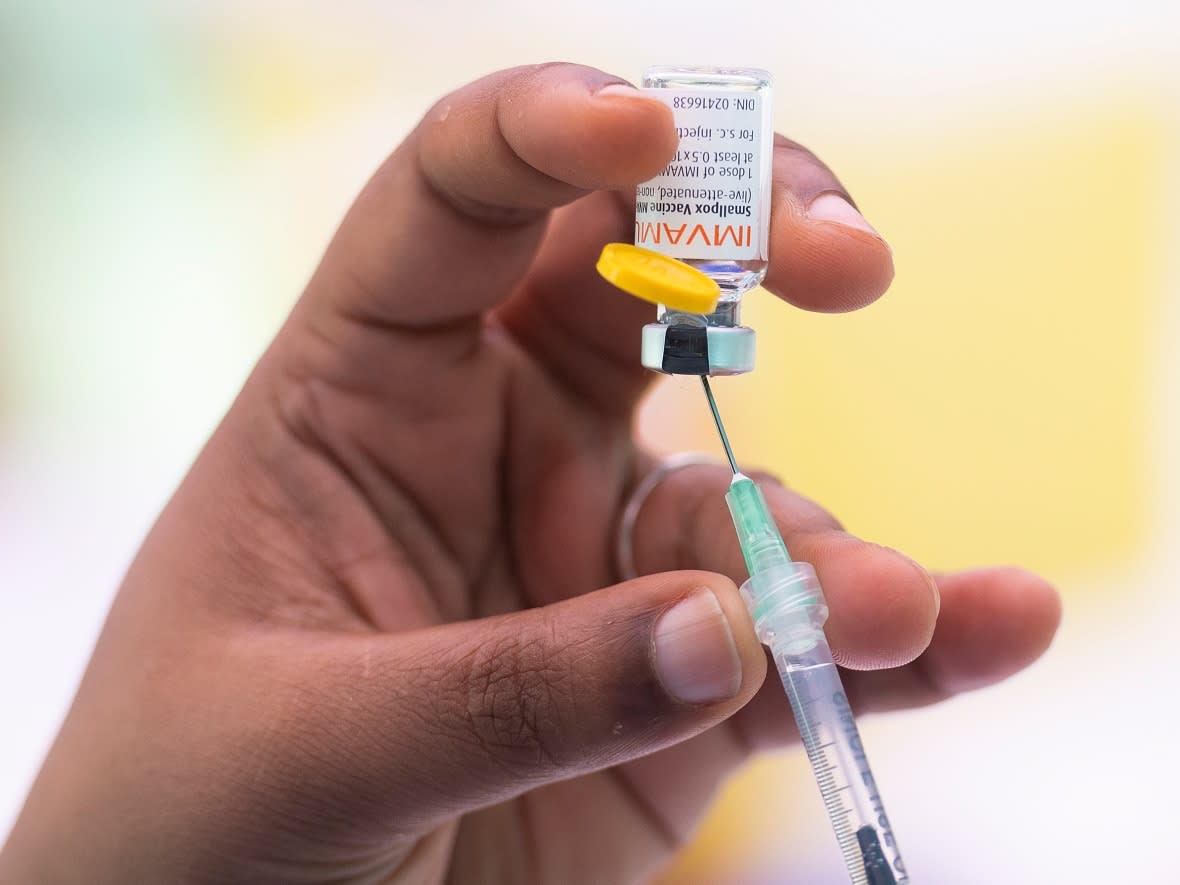Calgarians have new way to access monkeypox vaccine as case counts tick up

As monkeypox cases continue to be identified in Alberta, Calgarians who are at risk for contracting the virus will have increased access to the vaccine starting this week.
According to the province, 36 cases of monkeypox — all in adults — had been identified as of Sept. 14. That's more than double the number of 16 confirmed cases on Aug. 10.
And roughly 3,800 eligible people have been vaccinated with a first dose of Imvamune, primarily through Alberta Health Services clinics.
"I think we've seen sort of a downturn in interest and awareness of monkeypox, in particular the vaccine," said Nolan Hill, gay men's health specialist at the Centre for Sexuality in Calgary.
WATCH | Calgary clinic hopes to increase awareness of the monkeypox vaccine:
While anyone can contract monkeypox, men who have sex with men have been affected the most, in particular those with new or multiple sexual partners, health officials say.
The Centre for Sexuality is set to start providing shots to those who might not otherwise get vaccinated.
This week, it will begin offering Imvamune doses — in partnership with the AHS program Safeworks — at its Wednesday and Thursday evening clinics, between 5 and 7 p.m.

The organization, which already offers other shots, including the HPV vaccine, will be the only non-AHS location in the province offering the monkeypox vaccine.
"We're hopeful to see some of those people who may have fallen through the cracks or [those] who may have not been thinking so much about it because they face barriers in accessing health care because of stigma," said Hill, noting the centre sets out to provide a "safe space" for people with a focus on protecting privacy.
"A lot of people may not have been comfortable going into the Sheldon Chumir [health centre], where they may have been seen by other people," he said.
Hill believes they'll also attract people who haven't been able to attend daytime clinics.
"That's a huge draw for a lot of people, being able to come after work hours."
According to Hill, monkeypox vaccine appointments have to be booked in advance with a dedicated nurse, and the clinic is set up to give out approximately eight doses a week to start.
AHS said that while it has been offering the vaccine to Calgarians at the Sheldon Chumir clinic, it has worked to help people who are facing barriers in other locations on a case-by-case basis.
Vaccine, awareness necessary, doctor says
According to Dr. John Gill, a University of Calgary infectious disease specialist, vigilance is key.
At this time, he said, there is "very little" community transmission in Alberta.
"Very little is not zero, and if you ignore it, it can amplify."
In most of the cases Gill is aware of, contact tracing has been able to identify the source of transmission — many patients have contracted the virus outside of Alberta.
"But we're worried that the infection may be low grade severity, and it may be transmitted at a low frequency within communities, and it isn't until someone gets really sick that we realize that they've got monkeypox."
One key concern, according to Gill, is the lesions don't always present as obvious monkeypox.
Get those people at risk immunized so this doesn't become a smouldering problem - Dr. John Gill, University of Calgary infectious disease specialist
"Not all lesions are so nasty that people rush off to the doctor to get an opinion. We want it to disappear. We need the effort now. Get rid of it. Get people aware. Get those people at risk immunized so this doesn't become a smouldering problem that spreads from initial risk group into the wider and wider population," said Gill.
While there are no reports of hospitalizations, he said, the infection can cause severe pain and leave patients needing time off work.
"A lot of diagnostic testing, a lot of vaccination, a high awareness, behaviour modification — all will help, if we're lucky, stop the epidemic stone dead, and if not, keep it at a very low level."
An Alberta Health spokesperson said the risk for the general public is low in Alberta, and the province has yet to make a decision about rolling out second doses of the monkeypox vaccine.
"Alberta is awaiting guidance from the National Advisory Committee on Immunization (NACI) on second doses, which is expected in the coming weeks," Lisa Glover said in a statement.
"In an effort to keep the numbers down and prevent the infection from spreading, we continue to work with our federal, provincial and territorial public health partners to investigate cases of monkeypox in Canada."
Hill said if and when Alberta decides to offer second doses, the Centre for Sexuality will be ready to help with that rollout.


